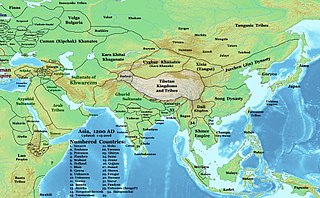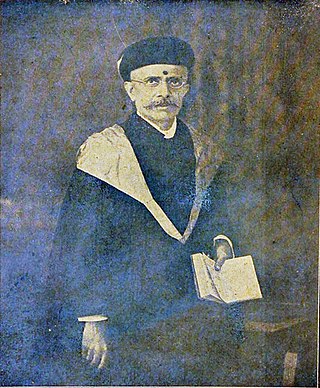Related Research Articles
Indian epic poetry is the epic poetry written in the Indian subcontinent, traditionally called Kavya. The Ramayana and the Mahabharata, which were originally composed in Sanskrit and later translated into many other Indian languages, and the Five Great Epics of Tamil literature and Sangam literature are some of the oldest surviving epic poems ever written.
Pannalal Nanalal Patel was an Indian author known for his contributions in Gujarati literature. He wrote more than 20 short story collections, such as Sukhdukhna Sathi (1940) and Vatrakne Kanthe (1952), and more than 20 social novels, such as Malela Jeev (1941), Manvini Bhavai (1947) and Bhangyana Bheru (1957), and several mythological novels. He received the Jnanpith Award in 1985. Some of his works were translated as well as adapted into plays and films.

Narsinh Mehta, also known as Narsinh Bhagat, was a 15th-century poet-saint of Gujarat, India, honored as the first poet, or Adi Kavi, of the Gujarati language. Narsinh Mehta is member of Nagar Brahman community. Narsinh became a devotee of Krishna, and dedicated his life to composing poetic works described as bhakti, or devotion towards Krishna. His bhajans have remained popular in Gujarat and Rajasthan for over 5 centuries. Most notably, his composition Vaishnav Jan To was Mahatma Gandhi's favorite and became popular with freedom fighters across India.

Vallathol Narayana Menon was a Malayalam poet and one of the triumvirate of modern Malayalam poetry, along with Asan and Ulloor. The honorific Mahakavi was applied to him in 1913 after the publication of his MahakavyaChitrayogam. He was a nationalist poet and wrote a series of poems on various aspects of the Indian freedom movement. He founded the Kerala Kalamandalam and is credited with revitalising the traditional Keralite dance form known as Kathakali.
The history of Gujarati literature may be traced to 1000 AD, and this literature has flourished since then to the present. It is unique in having almost no patronage from a ruling dynasty, other than its composers.

Hoysala literature is the large body of literature in the Kannada and Sanskrit languages produced by the Hoysala Empire (1025–1343) in what is now southern India. The empire was established by Nripa Kama II, came into political prominence during the rule of King Vishnuvardhana (1108–1152), and declined gradually after its defeat by the Khalji dynasty invaders in 1311.

Umashankar Jethalal Joshi was an Indian poet, scholar and writer known for his contributions to Gujarati literature. He wrote most of his works in Gujarati.

Narmadashankar Lalshankar Dave, popularly known as Narmad, was an Indian Gujarati-language poet, playwright, essayist, orator, lexicographer and reformer under the British Raj. He is considered to be the founder of modern Gujarati literature. After studying in Bombay, he stopped serving as a teacher to live by writing. During his prolific career, he introduced many literary forms in Gujarati. He faced economic struggles but proved himself as a dedicated reformer, speaking loudly against religious and social orthodoxy. His essays, poems, plays and prose were published in several collections. His Mari Hakikat, the first autobiography in Gujarati, was published posthumously. His poem Jai Jai Garavi Gujarat is now the state anthem of Gujarat state of India.

Nanalal Dalpatram Kavi was an Indian writer and poet in Gujarati language of Gujarati literature. His name is sometimes spelled as Nhanalal.
Modern Kannada literature refers to the body of literature written in the Kannada language, a language spoken mainly in the Indian state of Karnataka. The Kannada script is the writing system used in Kannada literature. In the last forty years, eight modern Kannada authors have been awarded the Jnanpith award, a prestigious private literary award in India. In addition, the Sahitya Akademi Award, the second-highest award for literature granted by the Government of India, has been conferred upon Kannada writers fifty times.

Vijayanagara literature in Kannada is the body of literature composed in the Kannada language of South India during the ascendancy of the Vijayanagara Empire which lasted from the 14th through the 16th century. The Vijayanagara empire was established in 1336 by Harihara I and his brother Bukka Raya I. Although it lasted until 1664, its power declined after a major military defeat by the Shahi Sultanates in the battle of Talikota in 1565. The empire is named after its capital city Vijayanagara, whose ruins surround modern Hampi, now a World Heritage Site in Karnataka.

Sukhlal Sanghvi, also known as Pandit Sukhlalji, was a Jain scholar and philosopher. He belonged to the Sthanakvasi sect of Jainism. Pandit Sukhlal lost his eyesight at the age of sixteen on account of smallpox. However, he persisted and became profoundly versed in Jain logic and rose to become a professor at Banaras Hindu University. Paul Dundas calls him one of the most incisive modern interpreters of Jain philosophy. Dundas notes that Sanghavi represents what now seems to be a virtually lost scholarly and intellectual world. He was a mentor for famous Jain scholar Padmanabh Jaini. During his lifetime he won such awards as the Sahitya Akademi Award and won recognition from the Government of India by getting Padma Bhushan award. Sukhlalji was also known as Pragnachaksu because he was so vastly learned despite being visually disabled.

Dayaram (1777–1853) was a Gujarati poet of medieval Gujarati literature and was the last poet of the pre-British Gujarati school. He is known in Gujarati literature for his literary form called garbi, a lyric song. He was a follower of Pushtimarg of Hindu Vaishnavism. Dayaram, along with Narsinh Mehta and Meera, is considered a major contributor during the Bhakti movement in Gujarati literature.

Anandshankar Bapubhai Dhruv was a Gujarati scholar, writer, educationist and editor from Bombay Presidency, British India. His name is revered as "Acharya" in Gujarat, and hence generally he is known as Acharya Anandshankar Dhruv.

Sitanshu Yashaschandra Mehta, better known as Sitanshu Yashaschandra, is a Gujarati language poet, playwright, translator and academic from India.
Natwarlal Pandya, better known by his pen name, Ushnas, was a Gujarati language poet from India.

Kishansinh Govindsinh Chavda, also known by his pen name Gypsy, was an Indian Gujarati-language writer and journalist. He studied at Gujarat Vidyapith and Santiniketan, and taught briefly. He started a printing press and was also involved in a writing career. He had spiritual interests which drove him to Aurobindo and Mirtola Ashrams. He wrote autobiographical works and translated some books.
Venibhai Jamnadas Purohit (1916-1980) was Gujarati poet, lyricist, short story writer and journalist.

Barkat Ali Ghulam Hussain Virani, known by his pen name Befām, was Gujarati author and poet especially known for his ghazals.
References
- 1 2 Amaresh Datta (1988). Encyclopaedia of Indian Literature. Sahitya Akademi. p. 1410. ISBN 978-81-260-1194-0.
- ↑ Jhaveri, Mansukhlal (1978). History of Gujarati Literature. Sahitya Akademi. p. 56.
- ↑ Sāṭhe, Gajānana Narasiṁha; Bhaṭṭa, Dīneśa Harilāla (1978). गिरधर-कृत रामायणGiradhara-Kr̥ta Rāmāyaṇa (in Hindi). Vāṇī Presa. pp. 17–18.